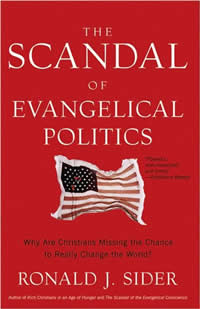Book Notes
 Ronald J. Sider, The Scandal of Evangelical Politics (Grand Rapids: Baker Books, 2008), 275pp.
Ronald J. Sider, The Scandal of Evangelical Politics (Grand Rapids: Baker Books, 2008), 275pp.
A friend recently mentioned that she still has her dog-eared copy of Ron Sider's book Rich Christians in an Age of Hunger (1977) from her college days thirty years ago. Christians in general, and evangelicals in particular, owe a debt of gratitude for that book, and many of the other thirty books Sider has written across the last several decades. I deeply appreciated his book Completely Pro-Life, in which he argued that Christians ought to protest anything and everything that threatens human life (like hand guns and tobacco companies), and not just a few litmus test issues (like abortion).
This book needs a different title. It's not a treatment of all the ways evangelicals have scandalized the gospel by their political engagements, even though he believes they have "floundered and failed" their way to "tragic failure" the last forty years. Rather than such a negative critique, as the title seems to imply, Sider attempts to craft a positive evangelical philosophy of politics. But this strikes me as an elusive quest. He notes that there is a rich tradition of political thinking by other Christians like Catholics, mainline Protestants, and certainly Anabaptists. It's not at all clear to me what would qualify as a uniquely "evangelical" contribution to the debate. Plus, I tend to agree with Garry Wills in What Jesus Meant that there's no such thing as a "Christian politics." In fact, this is a point that Sider seems to concede, as when he admits that the Bible doesn't give us any clear direction about many things, like democracy, free markets, or even killing and war (cf. 139–141, 192). And when the Bible does mention such issues, interpreting and applying its message is no easy task.
After a few introductory chapters, Sider's book is issue-oriented, and herein lies another problem. Given the complexity of the issues, a point he repeatedly makes, he's tried to cover far too much material — everything from the nature and purpose of the state, the sanctity of human life, marriage and family, creation care, nation-states, to whether we should expand the United Nations. Euthanasia gets one page, as does genetic engineering, while starvation and smoking receive but a half-page of consideration. Given how much Sider has tried to cover, this was unavoidable.
Plausible arguments can often be made for diverse views on complex political matters, which point Sider also admits. Almost every issue he discusses provokes significant ambiguity. He believes that the Bible would condemn abortion as murder, for example, but quickly admits that this conclusion "does not settle the question of what public laws on abortion Christians should promote" (148). I repeatedly felt like genuinely Christian points of view that Sider marshaled were compelling, but problematic when one tried to imagine how they might be mainstreamed into public policies. At the end of the day, though, he's surely right that because politics is so practically important, and because Jesus is Lord over all aspects of creation, it would be foolhardy for Christians to retreat to the evangelical position of forty years ago that favored spiritual "soul-winning" at the expense of engaging secular politics.


